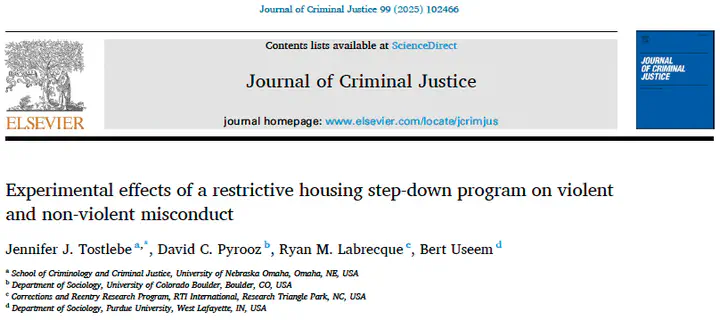Experimental effects of a restrictive housing step-down program on violent and non-violent misconduct

Abstract
This study addresses two issues that challenge policy, practice, and research on restrictive housing in prisons. First, the overarching need to reduce the footprint of restrictive housing and improve conditions of confinement. Second, the longstanding need to generate credible evidence of the effects of restrictive housing by ruling out selection bias. The Oregon Department of Corrections developed and implemented a step-down program for prisoners in long-term segregation and this study offers experimental evidence of its effects on misconduct. Between 2020 and 2022, 211 prisoners were randomly assigned to either remain in the business-as-usual condition (n=102), the intensive management unit, or voluntarily transfer to the treatment condition (n=109), a newly designed step-down unit. Official records for the full sample were paired with interviews conducted with 112 prisoners about three months post-randomization. Intent-to-treat (ITT) and local average treatment effects (LATE) are reported, testing preregistered hypotheses of official records and self-reports of misconduct in restrictive housing and general population settings. Post-randomization ITT and LATE estimates of the step-down unit condition on official report and self-report measures of misconduct in restrictive housing largely indicated null effects, with the exception of an increase in official records of violent misconduct in restrictive housing. Estimates of post-restrictive housing official misconduct in the general population indicated no meaningful group differences between the step-down unit and the business-as-usual conditions. The interpretation of findings is limited by the incomplete implementation of the step-down program and disruptions caused by COVID-19. Notably, however, the results suggest it is possible to house people in less restrictive conditions without increases in misconduct upon reentry to the general prison population. This study also serves as a baseline for future assessments and exemplifies how global events can impact correctional research.